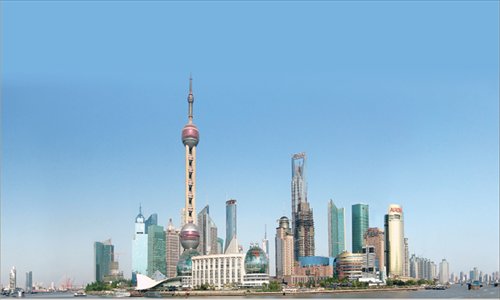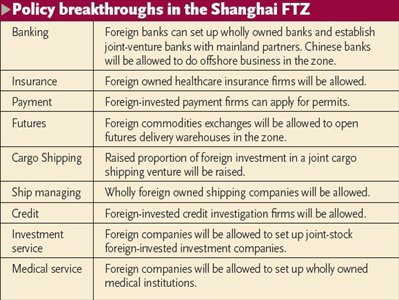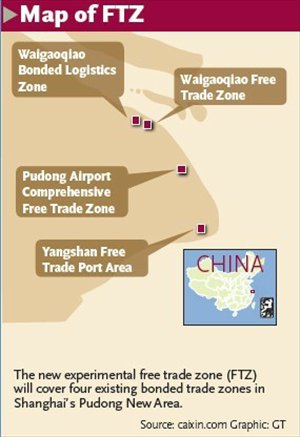New FTZ seen as a major step for deeper reform to solve long-term gridlock

Skyline of Shanghai's Lujiazui Financial District. Photo: CFP

Source: caixin.com

The establishment of the Shanghai Free Trade Zone (FTZ) on July 3 is generally believed to be a test platform for foreign-related reforms aimed at helping China catch up with global trends in areas like trade, investment and financial services, which a State Council release said would be crucial to achieving an "upgraded Chinese economy."
Shanghai's pilot FTZ will not only boost the city's influence as an international financial center, but also help the country's exporters adapt to the global market, Pan Zhengyan, deputy director of the Financial Research Center of the Shanghai Academy of Social Sciences, was quoted by business news portal caixin.com as saying.
"Currently, many countries are actively engaged in talks on regional trade agreements, such as the US-led Trans-Pacific Partnership (TPP). And in order to catch up with developing trade trends and keep risks under control, the central government needs to first experiment with the Shanghai FTZ," He Weiwen, co-director of the China-US-EU Study Center under the China Association of International Trade, told the Global Times.
Yet, the Shanghai FTZ means much more than just a zone for duty-free trading, according to Bala Ramasamy, a professor of economics at China Europe International Business School.
"The function of the FTZ in Shanghai would be better described as a deeper reform zone," he told the Global Times. "The idea is to test out deeper reforms in a particular area just like how the initial reform and opening-up started in the 1980s."
Lure foreign investors
Relaxing restrictions on foreign investment is an important part of reforms in the new FTZ.
Since the news broke, many foreign companies in the city have been looking forward to more details.
"Some Shanghai-based Singapore companies have already consulted me about the FTZ," Ong Siew Gay, consul-general of Singapore in Shanghai, told the Global Times. "They are very excited about the business opportunities the zone may bring."
Under the plan of the new FTZ, foreign banks will be allowed to directly set up wholly-owned subsidiaries or joint ventures with mainland partners in the zone; foreign commodity exchanges such as the London Metal Exchange will be approved to set up their own futures delivery warehouses; permission will be given to foreign companies like Sony and Nintendo to sell gaming consoles in the zone as long as they are produced there; and the FTZ will also permit foreign companies to establish wholly-owned healthcare insurance institutions, shipping companies and medical institutions as well as joint ventures of credit investigation and investment management, according to Caixin Century Weekly magazine.
Moreover, the FTZ will streamline approval procedures for both domestic and foreign investments. Foreign-invested projects will only need to report to relevant authorities in the FTZ instead of submitting applications for approval.
"Such an area where regulations are much looser will attract many foreign investors from different sectors to come and invest in these kinds of new businesses," said Bala Ramasamy.
"It's also good for the Shanghainese who will have more choices in terms of medical care, investment options and other services," he noted.
Financial reforms
Financial reform under the new FTZ is another key focus of the market, which is largely expected to further promote the liberalization of yuan capital accounts.
Before the FTZ proposal was approved, one of the areas that garnered the highest anticipation was that the plan would allow a trial for the yuan's full convertibility, interest rate liberalization and the building of offshore financial markets.
The latest news about the draft plan, currently under consideration from top authorities, shows it will seek to meet market expectations. It will marketize interest rates, provide offshore yuan services in the zone while also experimenting with the yuan's convertibility under capital accounts on condition that any risks remain controllable, according to recent Caixin reports.
However, since no detailed policies have been officially released, there have been controversies on how deep the reforms will truly go.
Increasing options for offshore yuan businesses have anchored the flagship policy that has won the most plaudits.
"It is natural to see offshore yuan businesses expand with the launch of the new FTZ," Zhou Yu, director of the Research Center of International Finance at the Shanghai Academy of Social Sciences, told the Global Times. "As overseas investors participate in trading activities in the FTZ, they will inevitably become involved in offshore yuan businesses, such as yuan-denominated investing and fundraising."
However, opinions are divided on how the liberalization of the interest rate and yuan capital accounts should be achieved.
Zhou believes, as long as the regulator can segregate the offshore market in the zone and the onshore market with strictly separated accounts and settlement channels to prevent cash flow between the two markets, it is possible for trials of liberalizing interest rates and yuan capital accounts to be carried out simultaneously.
"We can view Shanghai's FTZ as a smaller Hong Kong, so it is feasible for us to isolate risks in the offshore market from the onshore market, albeit not entirely," Zhou said. He added that in the beginning regulators may further control risks through limited quotas of capital flow in and out of the zone.
However, Sun Lijian, deputy director of the School of Economics at Fudan University, said interest rate liberalization should be the first priority.
Otherwise large amounts of hot money would flow in to profit from an interest arbitrage, threatening China's financial market and real economy.
"I suggest regulators liberalize interest rates in the zone first and soon take this nationwide. Only when interest rates are fully under market forces nationwide can we try capital account liberalization in the zone - the sequence is important," Sun said. "The reason is as long as the space for arbitrage exists, there would always be hot money flowing in disguised as trade capital - we have seen a lot of similar situations in the current state of foreign trade."
However, the process of interest rate liberalization should be quick, as opening-up of capital accounts is the core competitiveness of a FTZ, Sun said.
China has previously planned to try out liberalization of interest rates and yuan capital accounts in some special regions, but these were not fully realized due to concerns about risk. For example, the country intended to liberalize interest rates in the Wenzhou financial reform pilot zone, but eventually gave up the trial.
It also launched a special trade zone last year in Qianhai, Shenzhen, allowing Hong Kong banks to offer cross-border yuan loans to Chinese mainland companies operating in the zone. But to date, the yuan still lacks full convertibility in Qianhai with no news on what that long-awaited status will eventually arrive.
No matter what detailed policies come out, the FTZ in Shanghai will bring an unprecedented impact to China's financial system, Sun said. "It will inevitably drive forward the process of opening financial markets, not just in the FTZ, but in the country as a whole."